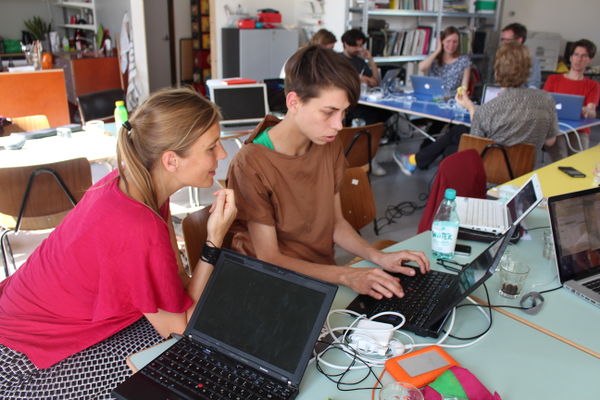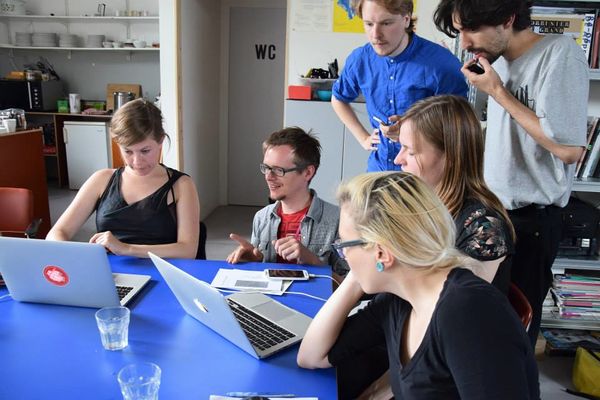Code text and text-to-speech: Difference between revisions
No edit summary |
No edit summary |
||
| Line 5: | Line 5: | ||
|Time=10:00-18:00 | |Time=10:00-18:00 | ||
|PeopleOrganisations=Constant Association for Art and Media, An Mertens, Michael Murthaugh, | |PeopleOrganisations=Constant Association for Art and Media, An Mertens, Michael Murthaugh, | ||
|Type= | |Type=HDSA2015 | ||
|Web=Yes | |Web=Yes | ||
|Print=Yes | |Print=Yes | ||
| Line 14: | Line 14: | ||
Picture this: In 2084, after the decay of Google and the deprecation of the Web 2.0 darknet, the web is reconstructed using the sustainable IRC protocol. In place of the burned-out centralized data centers created at the turn of the century, software in this new network is deployed as lightweight interogable bots in ad-hoc mesh networks and are rewritten and mutated as needed. Different bots crawl the different archives (archive.org, wikipedia, google, gitorious) and publish parts of conversation in different spaces (etherpad, wiki, print, epub). The result is a social space for writing (software, fiction, documentation) and file-sharing where software and services are as verbose as the participants. | Picture this: In 2084, after the decay of Google and the deprecation of the Web 2.0 darknet, the web is reconstructed using the sustainable IRC protocol. In place of the burned-out centralized data centers created at the turn of the century, software in this new network is deployed as lightweight interogable bots in ad-hoc mesh networks and are rewritten and mutated as needed. Different bots crawl the different archives (archive.org, wikipedia, google, gitorious) and publish parts of conversation in different spaces (etherpad, wiki, print, epub). The result is a social space for writing (software, fiction, documentation) and file-sharing where software and services are as verbose as the participants. | ||
For this workshop a basic knowledge of programming came in handy. For those familiar to Python An and Michael proposed to develop chatbots that can translate text-to-speech so we could give each of the AI personalities a personal voice. Using Free Software & Free Art Licenses only. | For this workshop a basic knowledge of programming came in handy. For those familiar to Python An and Michael proposed to develop chatbots that can translate text-to-speech so we could give each of the AI personalities a personal voice. Using Free Software & Free Art Licenses only. | ||
[[File:Constant2.JPG|Code, text and text-to-speech workshop|600px]] | [[File:Constant2.JPG|Code, text and text-to-speech workshop: An explaining stuff|600px]] | ||
[[File:Michael-explaining.jpg|Code, text and text-to-speech workshop|600px]] | [[File:Michael-explaining.jpg|Code, text and text-to-speech workshop: Michael explaining stuff|600px]] | ||
Revision as of 14:21, 7 March 2016
Template:Events Workshop by An Mertens and Michael Murthaugh, Constant Association for Art and Media (BE).
Picture this: In 2084, after the decay of Google and the deprecation of the Web 2.0 darknet, the web is reconstructed using the sustainable IRC protocol. In place of the burned-out centralized data centers created at the turn of the century, software in this new network is deployed as lightweight interogable bots in ad-hoc mesh networks and are rewritten and mutated as needed. Different bots crawl the different archives (archive.org, wikipedia, google, gitorious) and publish parts of conversation in different spaces (etherpad, wiki, print, epub). The result is a social space for writing (software, fiction, documentation) and file-sharing where software and services are as verbose as the participants.
For this workshop a basic knowledge of programming came in handy. For those familiar to Python An and Michael proposed to develop chatbots that can translate text-to-speech so we could give each of the AI personalities a personal voice. Using Free Software & Free Art Licenses only.

